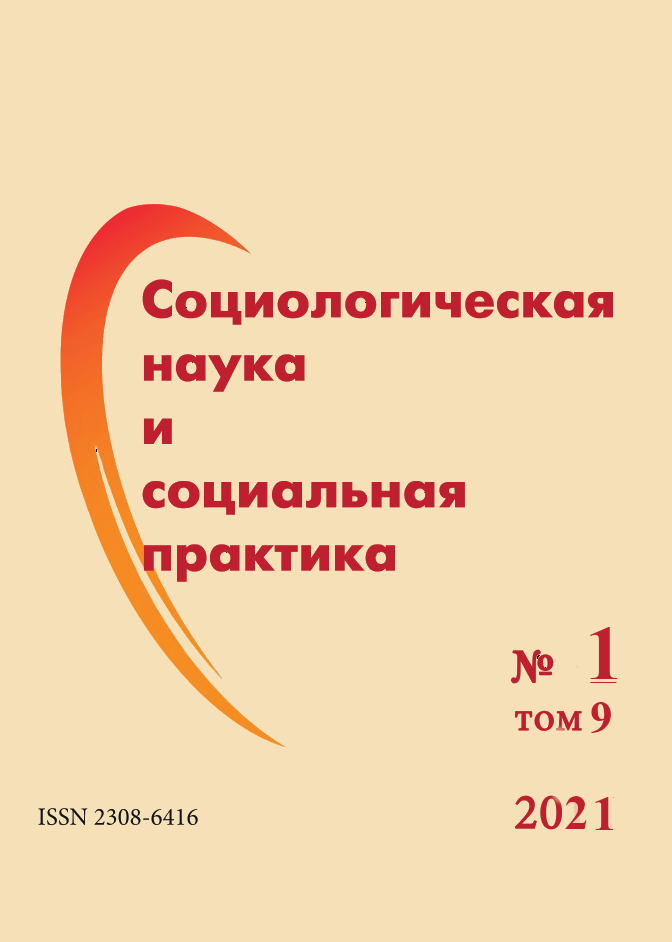Типы справедливости в договорных отношениях
Научная статья
Аннотация
Литература
2. Девятко И. Ф. Обмена социального теории // Большая российская энциклопедия: [в 35 т.] / гл. ред. Ю. С. Осипов. М. : Большая российская энциклопедия, 2013. Т. 23. С. 487–488.
3. Зиммель Г. Избранное : [в 2 т.] / [сост.: С. Я. Левит, Л. В. Скворцов ; отв. ред. Л. Т. Мильская]. М. : Юрист, 1996. Т. 1. 670 с.
4. Зиммель Г. Экскурс о чужаке / Пер. А. Филиппова // Социологическая теория: история, современность, перспективы. СПб. : Владимир Даль, 2008. С. 9–14.
5. Милль Дж. С. Об определении предмета политической экономии и о методе исследования, свойственном ей // Философия экономики. Антология / Под ред. Д. Хаусмана, М. : Институт Гайдара, 2012. С. 987–1023.
6. Осипов Г. В. История социологии в Западной Европе и США / П. П. Гайденко, Л. Г. Ионин, Х. Йоас [и др.]. М. : Норма, 1993. 423 с.
7. Ритцер Дж. Современные социологические теории / [Пер. с англ. А. Бойков, А. Лисицына]. 5-е изд. СПб. : Питер, 2002. 688 с.
8. Смит А. Исследование о природе и причинах богатства народов : [пер. с англ.] М. : Эксмо, 2009. 956 с.
9. Хоманс Дж. Социальное поведение как обмен // Современная зарубежная социальная психология / Под ред. В. И. Добренькова. М. : Изд-во Московского университета, 1984. С. 82–91.
10. Хоманс Дж. Социальное поведение: его элементарные формы // Социальные и гуманитарные науки. Серия 11. Социология. 2001. № 2. С. 117–163.
11. Abrahamson B. Homans on exchange // American Journal of Sociology. 1970. Vol. 76. P. 273–284.
12. Adams J. S. Inequity in Social Exchange // Advances in Experimental Social Psychology. 1965. Vol. 2. P. 267–299.
13. Berger J., Anderson B., Cohen B. Structural Aspects of Distributive Justice: A Status Value Formulation // Sociological Theories in Progress. Vol. II. Boston: Houghton Mifflin,1972. P. 119–146.
14. Bies R. Interactional (In)Justice: The Sacred and the Profane // Advances in Organizational Justice. Stanford University Press, 2001. P. 89–118.
15. Collett J. L. (Re)Integrating Simmel in Contemporary Social Exchange: The Effect of Nonpartisans on Relational Outcomes // Social Forces. 2011. Vol. 90. № 2. P. 617–637.
16. Ekeh P. Social exchange theory: The two traditions. Cambridge (Mass.),1974. 237 p.
17. Hegtvedt K., Killian C. Fairness and emotions: Reactions to the process and outcomes of negotiations // Social Forces. Sept. 1999. Vol. 78. № 1. P. 269–302 DOI: 10.1093/sf/78.1.269.
18. Goffman E. Interaction ritual: essays on face-to-face interaction. Chicago : Aldine, 1967.
19. Homans G. Social Behavior: Its Elementary Forms. New York: Harcourt Brace Jovanovich, 1974. 386 p.
20. Jameson S. Principles of Social Interaction // American Sociological Review. 1945. Vol. 10. № 1. P. 6–12.
21. Jasso G. A New Theory of Distributive Justice // American Sociological Review. 1980. Vol. 45. № 1. P. 3–32.
22. Leventhal G., Jurgis K., J. and Fry W. Beyond Fairness: A Theory of Allocation Preferences. Justice and Social Interaction, 1980. № 3. P. 167–218.
23. Lind E., Tyler T. The Social Psychology of Procedural Justice. Plenum, 1988. DOI: 10.1007/978-1-4899-2115-4
24. Molm L., Peterson G., Takahashi N. In the Eye of the Beholder: Procedural Justice in Social Exchange // American Sociological Review. 2003. Vol. 68. № 1. P. 128–152.
25. Molm L., Collett J., Schaefer D. Conflict and Fairness in Social Exchange // Social Forces. June 2006. Vol. 84. № 4. P. 2331–2352.
26. Swanson G. On Explanations of Social Interaction // Sociometry. 1965. Vol. 28. № 2. Р. 101–123.
Поступила: 30.11.2020
Опубликована: 19.03.2021








 Издатель: Федеральное государственное бюджетное учреждение науки
Издатель: Федеральное государственное бюджетное учреждение науки